On September 27, 2021, anti-Taliban Pashtun nationalists and democrats as well as social activists in Pakistan commemorated the 25th anniversary of the Taliban's hanging of the former Afghan President Dr. Mohammad Najibullah in 1996 in Kabul after he had taken refuge in the United Nations headquarters. To avoid a similar execution by the Taliban this year, Afghan President Ashraf Ghani left Kabul for self-exile in the United Arab Emirates on August 15, 2021, when the Taliban forces entered Kabul, having been emboldened to seize power by the Doha agreement of 2020 crafted by U.S. Special Representative Zalmay Khalilzad.[1]
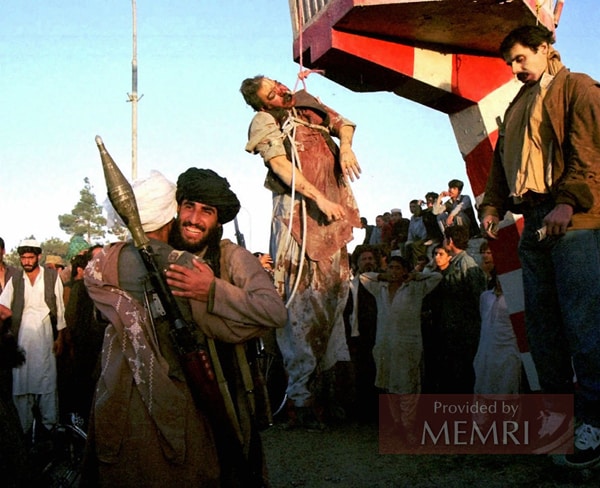
In 1996, Afghan Taliban hang former President Dr. Najibullah (photo courtesy: unknown)
The Islamic Emirate of Afghanistan (the Taliban jihadi organization that now controls Afghanistan) had twice threatened clearly that it would execute Ashraf Ghani whenever it takes power. Anticipating victory soon after having signed the Doha agreement in February 2020 with the United States, the Islamic Emirate had revealed that it would execute President Ashraf Ghani.[2] This was a solemn commitment that the Afghan Taliban made to their own ranks.
A year later, in February 2021, the Islamic Emirate reiterated its plan to execute President Ashraf Ghani as it had hanged Dr. Najibullah, stating: "The current conditions in our country are exactly the same again as then [in 1996]": "God willing, the fate of every invader and slave [Ashraf Ghani] will be the same as that of the Soviets and their slaves [Najibullah]."[3]
However, the U.S. never reacted to these consistent repeated threats by the Taliban, which left the impression that the United States relates to the democratically elected government and to President Ashraf Ghani in particular as an obstacle to be removed and seemingly accepted the Taliban threat. Even the media did not report on the threats, as if they were eager to get rid of this problem in the way of the Taliban and facilitate the great takeover of Afghanistan, because reporting it would have blocked the Doha agreement and kept the Taliban away from power.
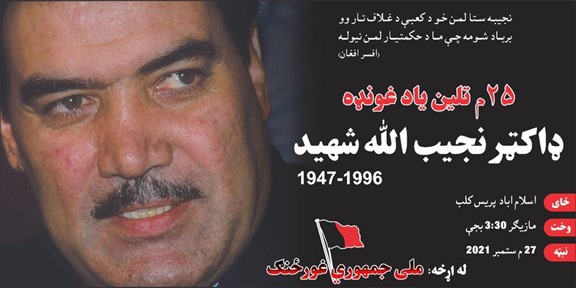
An event was organized in Islamabad on September 27, 2021, to mark the Taliban's hanging of former Afghan president Dr. Najibullah
The Taliban mujahideen's hanging of Dr. Najibullah's in 1996 has acquired a new significance. On September 27, 2021, an event was organized in Islamabad by Pashtun nationalists, democrats, and other members of civil society to mark the anniversary of the event.[4] "We paid tribute to the former Afghan President Shaheed Dr. Najibullah in a memorial reference," wrote Pakistani lawmaker Mohsin Dawar on his Twitter account, adding: "His legacy has become more important now because of the current situation in Afghanistan."[5] Mohsin Dawar is also the chairman of the newly established National Democratic Movement (NDM).
A poem written in the honor of Dr. Najibullah by Afrasiab Khattak – a Pashtun nationalist leader and a noted democrat who has served as chairman of the Human Rights Commission of Pakistan – was also recited at the event in Islamabad by Mohsin Dawar. A few weeks before the Afghan Taliban seized power in Kabul this year, former Pakistani senator Afrasiab Khattak warned against "regional re-Talibanization" and accused the United States of inserting the Taliban jihadi forces into Afghanistan's political system.[6]
"The induction of U.S. armed forces to bring down the brutal Taliban regime in Afghanistan [after the 9/11 terror attacks on American cities], and U.S. drone strikes against Al-Qaeda fighters in Pakistan, Afghanistan, the Middle East, and Africa, created the impression that the United States and the West regard the Islamic extremists/militants as their enemies," Afrasiab Khattak wrote in an article published by Afghan website ToloNews.com.[7]
"But the recent developments – the U.S.-Taliban Doha deal in particular – denies this perception. Initially many people thought the Doha deal represented a political expedient of the [Donald] Trump administration in preparation for the presidential elections in 2020 in the U.S. But the way the new U.S. administration [under President Joe Biden] has refused to reconsider the Doha deal, despite its failure in bringing peace and reconciliation to Afghanistan, proves it to be the consistent U.S. policy toward [being lenient against] the Taliban," he added.[8]
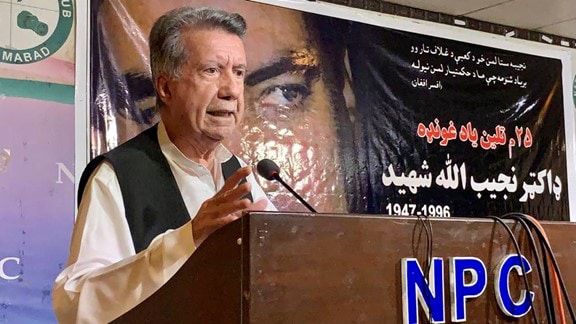
Afrasiab Khattak speaks at the September 27 conference in Islamabad
Commenting further on the 2020 Doha agreement, Afrasiab Khattak said: "It seems the U.S. wants to inject the Taliban into the Afghan system even at the cost of the gains of the Afghan state and society during the last two decades, which includes the emergence of a constitution-based state system, thriving urban centers, and a nascent but dynamic civil society (with an independent media in particular). Afghanistan has also been joining the regional and international mainstream."[9]
It is this feeling of loss of democratic values and commitment to human rights resulting from the Doha deal bulldozed by U.S. Special Representative Zalmay Khalilzad that has forced the democrats like Mohsin Dawar and Afrasiab Khattak in Pakistan to voice their concern over America's role in encouraging the Taliban jihadis.[10] Khattak – who also spoke at the September 27 event in Islamabad – tweeted that the 25th commemoration of "Dr. Najibullah's martyrdom is being observed amidst a new invasion of Afghanistan" and "It is... important that if we read Dr. Najib's speeches, write-ups and analyses after so many years, we will better understand the nature of new and old aggressions [against Afghan democracy]..."[11]
In an earlier article in 2014 marking the Taliban's hanging of the Afghan leader, Pakistani writer Dr. Mohammad Taqi stressed that the Pakistani military's Inter-Services Intelligence (ISI) – which has created, sheltered, and supported the Afghan Taliban for decades – was behind the assassination of Dr. Najibullah.
Mohammad Taqi noted: "The Pakistani security establishment did not want the Afghan Prometheus [Dr. Najibullah]... alive. He had withstood the combined Pakistani-Arab-U.S. onslaught through Afghan rebels and Arab mercenaries even after the Soviet withdrawal. In fact, Dr. Najibullah inflicted the most humiliating defeat on the ISI-backed mujahideen in the March 1989 Battle of Jalalabad after the Soviet pullout."[12] He added: "But the Pakistani junta was perhaps more wary of Dr Najibullah's Afghan nationalist credentials and a larger-than-life stature that he had attained on both sides of the Durand Line [the Afghan-Pakistan de facto border] after the Soviet departure. His opponents knew that, if left alive, Dr. Najibullah would continue to stand resolutely against Pakistani meddling in Afghanistan."[13]
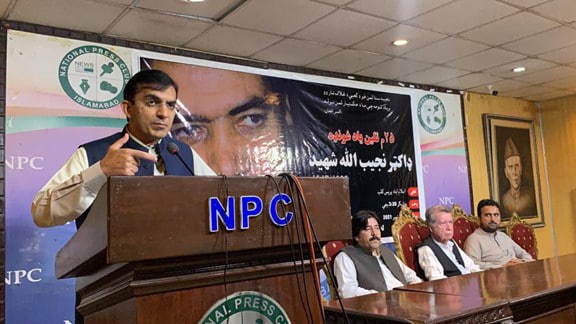
Mohsin Dawar of NDM addresses the event in Islamabad
Muska Najibullah, the daughter of Dr. Najibullah, marked the Taliban's hanging of her father, tweeting: "25 years ago from today, the Taliban entered Kabul. What they did next changed my life forever. It's not easy reliving this day, every year. But certainly, not this year because the men who executed my father and uncle, have returned again."[14] Muska Najibullah – telling her "personal story" for the first time observed: "What is happening to my country now is distressingly similar to what happened then."[15]
In an interview given a few months after the 2020 Doha agreement was signed between the United States and the Taliban, Muska Najibullah repeated her mother Dr. Fatana Najib's demand for an inquiry into the assassination of Dr. Najibullah by the Taliban. "What exactly happened at the UN compound on September 27, 1996? Who was behind the assassination of President Najibullah and his brother? What was the motive and why? How did they manage to kill a country's president and his brother? My mother's statement was an official request from our family to the Afghan government to undertake the necessary measures in opening an inquiry. A commission must... inquire into the facts and circumstances of the assassination," she told an Indian journalist.[16]
On September 27, 2021, Dr. Fatana Najib, a linguist and the former first lady who now lives in exile in New Delhi, issued a statement on Facebook marking the Taliban's murder of her husband. Reminding the international community that her husband "was assassinated against all human values at the UN office in the Afghan capital of Kabul 25 years ago despite that he had international guarantees of his security and protection," she added: "The progressive people of Afghanistan, especially the supporters of freedom, democracy, equal rights of men and women, human rights, and other values have the right to think about their future following the Taliban's arrival and the fall of the [Ashraf Ghani] government."[17]
Responding to Muska Najibullah, one Afghan youth wrote: "The Taliban have been committing war crimes for decades and... Dr. Najibullah was martyred by the Taliban and all the principles of humanity were trampled underfoot, which is a question mark for the International Court of Justice and international human rights bodies."[18] Khushal Khan, a Pashtun nationalist associated with the NDM, tweeted: "Remembering our hero, the leader who stood with his people to the end, former Afghan President Dr. Najibullah Shaheed [the martyr] on the 25th anniversary of his martyrdom. Will never forget how Taliban terrorists martyred Dr. Najib and thousands of our people."[19]
SUPPORT OUR WORK

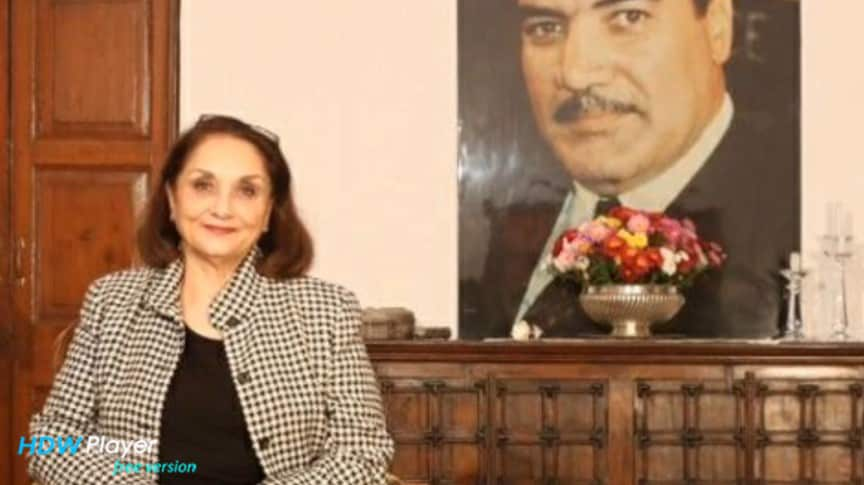
Dr. Fatana Najib, the former first lady of Afghanistan, lives in exile in New Delhi
Jawad Azaar, a well-known Pashtun poet from Mardan district of Khyber Pakhtunkhwa province, wrote a poem and recited it in memory of the assassinated president of Afghanistan.[20] Umar Yousaf Khel, another poet, tweeted: "Kabul witnessed, Peshawar grieves; He was the peace messenger, I saw him in the gallows."[21] Qayum Afghan, a peace activist, tweeted that Dr. Najibullah was the "true leader of Afghanistan" who "sacrificed his life but did not compromise on the dignity of Afghanistan."[22]
Rukhan Yousafzai, a Pashtun commentator, wrote an article in the Urdu daily Roznama Shahbaz of Peshawar in which he rued the fact that, barring the events organized by the National Democratic Movement (NDM) and some comments on social media, not many socialists and comrades now remember Dr. Najibullah, who had expressed the view that the Taliban, being Pashtuns, would not execute him. He noted that Dr. Najibullah was informed that the Taliban he mentioned were not the Pashtuns he understood but "some other people" supported by Pakistani intelligence and Arab jihadis of Al-Qaeda whose tradition it was to hang dead bodies.[23]
There are two reasons anti-Taliban groups like NDM stress the legacy of Dr. Najibullah: First, the re-emergence of the Taliban jihadis in control of Afghanistan could threaten the democratic and secular values the Pashtuns stand for and also engender a regional re-Talibanization; second, the global media's role in regularly painting all Pashtuns as the Taliban is not in sync with ground realities, especially in the Pakistan-Afghanistan border region where hundreds of Pashtun nationalist leaders were assassinated by the Taliban during the post-9/11 decades.
The matter of portraying the entire Pashtun community as the Taliban again became a contentious issue in the second week of October 2021 after Pakistani Prime Minister Imran Khan, whose country has supported the Afghan Taliban in Afghanistan, said: "The Pashtuns started attacks on the state [of Pakistan]."[24]
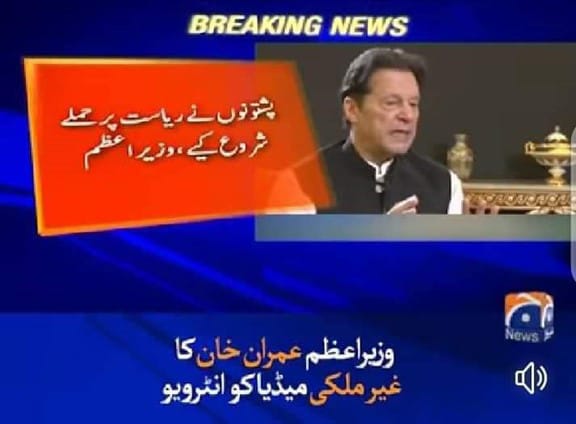
Pashtuns started attacks on the state, says Prime Minister Imran Khan
Pashtuns and independent activists in Pakistan and Afghanistan were angry at Imran Khan's statement. Mohsin Dawar commented: "Once again the PM of Pakistan is displaying an absolute lack of shame in declaring Pashtuns as terrorists. He knows well how he is putting salt on the wounds of millions of Pashtuns who have lost their loved ones to Taliban's terror. This racism against Pashtuns must stop."[25]
Manzoor Pashteen, a peace activist, reacted: "Imran khan [is] consistently giving racial and contradictory explanations about Pashtuns to criminalize them & hide the brutalities committed with them in the name of war on terror & security."[26] Shamsullah, a Pakistani student, reminded Imran Khan: "Taliban are anti-Pashtun proxies [of Pakistan]. They are terrorists who continue to attack everything that Pashtuns stand for. Pashtuns have resisted Taliban with their lives. We've lost thousands of our people to their terrorism."[27]
It is in this context that Dr. Najibullah's hanging by the Afghan Taliban, who are in power again in Kabul aided by Pakistani intelligence, has become a "litmus test" for exposing all jihadi and Islamist forces in the Pakistan-Afghanistan region, tweeted Pakistani writer Mona Naseer.[28] The poem written by Afrasiab Khattak and recited at the event in Islamabad brings out these sentiments of Pashtuns living across the Pakistan-Afghanistan border. A translation of some stanzas read:
"Even if Pakhtunkhwa bleeds,
"The stars disappear,
"The convoy of stars moves on and reaches the bright sun;
"If the night is dark, let it be dark,
"At last, it will culminate in the morning,
"I shall grow and become flower,
"And you will keep watching the paths of spring perplexed;
"Death lies in immobility,
"Keep moving on,
"Don't be a stagnant pool, come out."
* Tufail Ahmad is Senior Fellow for the MEMRI Islamism and Counter-Radicalization Initiative; Yigal Carmon is President and Founder of MEMRI.
[1] MEMRI Daily Brief No. 304, The Taliban Victory – Made In USA, August 16,2021.
[2] MEMRI JTTM Report, Urdu Daily: Afghan Taliban Threaten To 'Seize Kabul In 48 Hours' And To Kill Afghan President Ashraf Ghani, March 17, 2020.
[3] MEMRI JTTM Report, Afghan Taliban Envision Execution Of President Ashraf Ghani As They Hanged Dr. Najibullah At United Nations Office In Kabul In 1996, February 18, 2021.
[4] YouTube.com/watch?v=HG-dlTaevHE, October 1, 2021. We are thankful to senior journalist Rifatullah Orakzai in Peshawar for assistance in translations of quotes in this brief.
[5] Twitter.com/mjdawar, September 27, 2021.
[6] MEMRI Special Dispatch No. 9382, Former Pakistani Senator Afrasiab Khattak Castigates 'Emerging U.S.-Taliban Nexus' In Afghanistan: 'There Are 36,000 Religious Seminaries In Pakistan Functioning As Factories To Produce Taliban', June 8, 2021.
[7] MEMRI Special Dispatch No. 9382, Former Pakistani Senator Afrasiab Khattak Castigates 'Emerging U.S.-Taliban Nexus' In Afghanistan: 'There Are 36,000 Religious Seminaries In Pakistan Functioning As Factories To Produce Taliban', June 8, 2021.
[8] MEMRI Special Dispatch No. 9382, Former Pakistani Senator Afrasiab Khattak Castigates 'Emerging U.S.-Taliban Nexus' In Afghanistan: 'There Are 36,000 Religious Seminaries In Pakistan Functioning As Factories To Produce Taliban', June 8, 2021.
[9] MEMRI Special Dispatch No. 9382, Former Pakistani Senator Afrasiab Khattak Castigates 'Emerging U.S.-Taliban Nexus' In Afghanistan: 'There Are 36,000 Religious Seminaries In Pakistan Functioning As Factories To Produce Taliban', June 8, 2021.
[10] MEMRI Daily Brief No. 215, Handing Afghanistan Over To The Taliban – The Menacing Brinkmanship In Kabul As Ashraf Ghani Government Is Badgered By Both The U.S. And The Taliban, April 21, 2020.
[11] Twitter.com/a_siab, September 26, 2021.
[12] Daily Times (Pakistan), September 24, 2014.
[13] Daily Times (Pakistan), September 24, 2014.
[14] Twitter.com/muskanajibullah, September 27, 2021.
[15] The Guardian (UK), September 27, 2021.
[16] The Indian Express (India), August 7, 2020.
[17] Facebook.com/groups/shahid.najibullah, September 27, 2021.
[18] Twitter.com/noormullakhail, September 27, 2021.
[19] Twitter.com/Khushal_Khattak, September 27, 2021.
[20] Twitter.com/NaqeebSays, September 27, 2021.
[21] Twitter.com/khail_yousaf, September 26, 2021.
[22] Twitter.com/Qayumafghan12, September 26, 2021.
[23] Roznama Shahbaz (Pakistan), September 27, 2021.
[24] Twitter.com/aima_kh, October 12, 2021.
[25] Twitter.com/mjdawar, October 11, 2021.
[26] twitter.com/ManzoorPashteen, October 12, 2021.
[27] Twitter.com/Shamsullah898, October 12, 2021.
[28] Twitter.com/mo2005, September 28, 2021.




